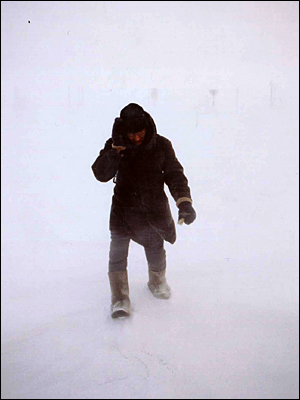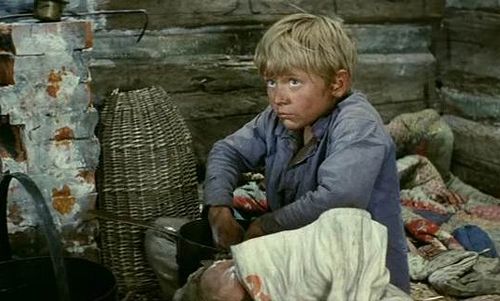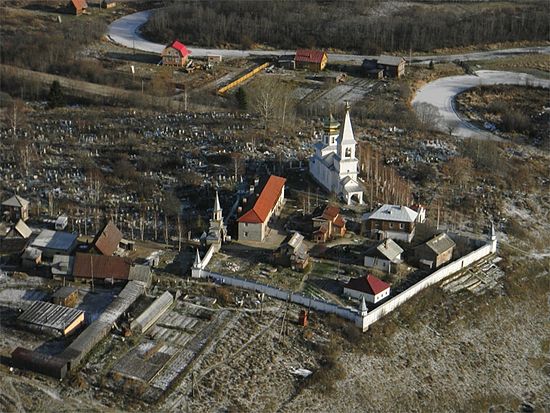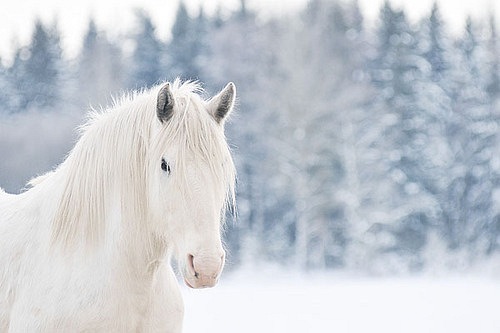 It’s cold. Thorny flakes of snow strike his face amidst the swirling snowstorm. Where is the earth, where the sky? Nothing but whiteness and indifference, nothing but loneliness and anguish, just like the life of Slavka, otherwise known as “the Czech”. He has nowhere to go; no one is waiting for him, anywhere. Why is he living? Why was he born? He raises his head to the empty sky, trying to forget all that is bitter and wearying, to spill out his pain. Even better, a glass of moonshine and the anguish would reside a bit, rolling itself into an icy bun somewhere in the depths of his stomach. It would all become a little easier to bear.
It’s cold. Thorny flakes of snow strike his face amidst the swirling snowstorm. Where is the earth, where the sky? Nothing but whiteness and indifference, nothing but loneliness and anguish, just like the life of Slavka, otherwise known as “the Czech”. He has nowhere to go; no one is waiting for him, anywhere. Why is he living? Why was he born? He raises his head to the empty sky, trying to forget all that is bitter and wearying, to spill out his pain. Even better, a glass of moonshine and the anguish would reside a bit, rolling itself into an icy bun somewhere in the depths of his stomach. It would all become a little easier to bear.
But there is no moonshine today, and he won’t find any anywhere. There is no food, either. Slava the Czech needs to take some action, make some decision, or die of hunger. Where should he go?
There is no work in the village, and Slava had already been fired from whatever jobs there were. Everyone drank in that impoverished hamlet—that is, everyone who stayed there to live—but Slava especially drank; that is, he drank all the time. He was almost never sober, and he drank whatever rubbish he could get his hands on. He could have frozen to death under any fence or poisoned himself with denatured alcohol, or died in flames after smoking drunk under his tattered blanket. Hadn’t scores of them perished from bad vodka in and around that village?
Only a few of his classmates were still alive—out of those who had not long ago abandoned that wretched locale. All the others sooner or later ended up in the old graveyard. But Slava the Czech was still alive.
Why? He himself did not know the answer. Life never pampered him with joy, and he would have been ready to die long ago, but here he was, still among the living for some inexplicable reason. Apparently his time had not yet come…
Slavka’s father was a real Czech who served in the German army and had been taken captive near Stalingrad. After the war, just like many other prisoners of war, he built roads and houses in the Soviet Union. Then came amnesty, and the former prisoners of war were given permission to leave. Some were able to return to their native countries, others were not. They russified, remained in Russia, married, and lived on, recalling their former lives like a dream. Slavka’s father was not able to leave; he married a local girl and continued to live in one of these poor Ural villages. He dampened his homesickness with wine, and got his wife to drink also. When Slava was born his parents were still drinking, and they never stopped.
So that the baby would not interrupt their drinking with his crying, they gave him a baby bottle filled with watered-down spirits. How didn’t he die? Apparently he had a lucky star. By age seven Slava was an alcoholic. He would wake up in the morning, eat his parent’s food scraps, and drink the booze leftover from last night’s binge.
It was boring at home and so he went to school. It was funny at school. True, they were mostly laughing at Slavka—playing foolishly, dressed in tatters, and drunk. His classmates never befriended him. He was just a hopeless, utterly hopeless case. The schoolteachers put up with his presence; at least he was warm at school, but at home he would freeze to death, or to the contrary, smother in carbon monoxide from the untended wood stove. Let him sleep, they thought, in the back of the room. He’s not long for this earth, anyway.
Sometimes Slavka the Czech would not make it to school—he would fall down drunk, right in the street. But he never froze. His parents died early from their inebriated life, and Slava was left all alone. Well, he had always been alone… His mother and father rarely ever spoke with him, or paid him any attention. They simply lived in his proximity. But he lived all by himself.
His life went by as in a dream, and sometimes he could not distinguish dream from reality. There were only a few clear days when he didn’t drink—perhaps no more than a few weeks of his life. But things only got worse from that. There was one clear moment—a bright, childish moment. Slava took his aching head in his hands: this childhood memory nagged at his sober mind.
It was a winter just as cold as this one. There was a blizzard… And Slava was continually freezing. He slept on the brick oven trying to get warm, but it often remained unlit. One morning Slavka went out into the yard and saw that the dog, Naida, which his father had recently dragged home from somewhere and immediately forgotten, was having puppies. These puppies were so tiny and funny, like toys. Slavka did not drink his parents’ leftover wine that day. He hastily scooped up the scraps of food but he didn’t eat them all—he took some to Naida.
 Slavka did not drink for about three weeks; there was no time. He had to find food for Naida, then tools, a hammer, nails, boards, and some rags to make a warm spot in the shed where the puppies would not freeze. When their eyes opened they became even more enjoyable. Slavka made plans to give them away, and keep one of them for himself: the brown one with the white spot on his chest, the bravest and liveliest.
Slavka did not drink for about three weeks; there was no time. He had to find food for Naida, then tools, a hammer, nails, boards, and some rags to make a warm spot in the shed where the puppies would not freeze. When their eyes opened they became even more enjoyable. Slavka made plans to give them away, and keep one of them for himself: the brown one with the white spot on his chest, the bravest and liveliest.
Slavka had already given him a name—Faithful. He couldn’t think of a better one. Faithful—that’s a good name for a dog! Now he’ll have a friend. A real friend, a friend who won’t laugh at him or scorn him, the eternally drunken, silly Slavka the Czech. He won’t look at him as a hopeless creature. After all, he isn’t hopeless, right? As long as he is alive there is hope. Maybe he’ll even quit drinking… When life is good and interesting, why drink?
He sat in the evening in the shed and Faithful nuzzled his palms with his wet brown nose, playing humorously and biting his trousers. When he grows up he’ll be his—Slavka’s dog. He’ll be big, strong, and true. And he’ll love him, Slavka. And it turns out that Slavka so badly needed someone to love him. He had never thought about this earlier, but now he understood that you really, really need at least someone to love you…
When the math teacher saw the sober Slavka she was amazed, and later shared her professional thoughts with her colleagues.
“It turns out that Slava the Czech has intelligent eyes… Can you imagine? How that child has not become an imbecile is just beyond me… Yes…”
The elderly physics teacher shook his head. “We do not know the brain’s full potential, the intellect’s resources, so to speak… Perhaps he should have become a very intelligent man… But anyway… Thank God he is not an imbecile…”
But everything ended in a flash. In the morning, a completely sober Slavka gathered the food scraps and set off for the shed. He joyfully opened the flimsy door, when something terrible bounded at him and knocked him off his feet. He was left sitting on the snow. He turned around and understood that it was Naida. She was horrifying, her fur standing on end, with a torn rope hanging from her neck. Naida ran across the snow into the orchard and howled horribly for a long time. This howl would later flash back to him often when the snows of a blizzard would swirl.
His heart froze, and he already knew that he shouldn’t go after Naida, that he would not find anything good there. But he went anyway, slowly, sinking into the snow at each step. There in the depths of the orchard, terrifyingly throwing back her disheveled head, Naida was howling. At her paws lay her dead puppies. Apparently Slava’s father had discovered them—lately they no longer mewed like kittens, but barked audibly.
They lay there so strangely, absolutely dead. And his Faithful was amongst them. His friend. Slavka leaned down and touched Faithful’s little brown paw. It was icy and stiff. Slavka stood there a little longer, placed his bundle of leftover food on the snow, and then slowly walked home. He finished the half-empty bottle of wine and then found a full bottle of vodka, opened it and drank until he began to retch.
In the evening his father beat him for that bottle. Yes, after those sober weeks, everything got worse. He would sometimes see the frightening Naida in his nightmares, the dead puppies, and the icy, little brown paw. Slavka shook his head to free it from that childhood memory. Time to forget it—many years have passed since then.
He closed the door to his house and hung the broken, rusty padlock so that the door would not fling open in the wind, but there was nothing in that broken-down hut to steal, anyway. Then he started walking, making his way with great difficulty through the snowstorm, to Miteinaya Hill, to the monastery. The monastery was located five kilometers from the village, but Slavka had never gone there before; they didn’t welcome drunks, and he was never sober.
But this was a special case. He had nothing to drink anyway, and had been fired from the last job in there was. Thus, there wasn’t much of a choice—either the monastery or the graveyard on the hill, right next to the monastery. It was an ancient cemetery, no less than four hundred years old. No, it was too early for him to go to the graveyard; he won’t go there himself. He’ll wait until they carry him there.
Laboriously he climbed the hill, hobbling and frozen through, to the snow-covered, remote monastery and knocked at the door of Father Sabbatius.
Father Sabbatius’ relates:
 The monastery with the cemetery on the hilltop. Slava the Czech, as they called him, came to the monastery in winter, during the coldest time, and we let him stay. He was just under thirty, maybe younger, short, thin, and a little wild. We gave him a cell, and an obedience: chopping wood, and carrying water from the spring on our monastery horse, Yagodka.
The monastery with the cemetery on the hilltop. Slava the Czech, as they called him, came to the monastery in winter, during the coldest time, and we let him stay. He was just under thirty, maybe younger, short, thin, and a little wild. We gave him a cell, and an obedience: chopping wood, and carrying water from the spring on our monastery horse, Yagodka.
Slava wasn’t baptized, and after living for a little while in the monastery and attending church services, he wanted to be baptized. I baptized him. After his baptism I took off my vestments, went outside, and saw an unfamiliar man sitting on the bench. I came closer and peered at him… It was Slava the Czech! I didn’t recognize him! The grace of baptism changes people greatly, and some even change in appearance. Well, Slava the Czech changed completely: his foolish mien was gone, and before me sat a serious, staid man. I noticed to my amazement that he had blue eyes! They were intelligent and thoughtful. That is how greatly his baptism transformed him.
With time that first grace apparently subsided, but the mark of the Holy Spirit changed him dramatically. He took very good care of Yagodka; they became friends, and although she is a stubborn creature she obeyed him. I suppose that Yagodka was the first friend he ever had in his life.
Did he drink while he was with us? Well, he had no money… We are strict about this in the monastery, and he valued his new life too highly. Slava the Czech lived in the monastery for ten years, labored, prayed, and then died suddenly of heart failure. His life was hard, terrible in fact, but the Lord did not allow him to die in a drunken state, poisoned by alcohol—the death of an alcoholic.
A miserable child and just as miserable an adult, he was very lonely, and the Lord brought him to the monastery. For my father and my mother have forsaken me, but the Lord hath taken me to Himself (Ps. 26:12). He died a baptized Christian, and laborer in a monastery. We served his funeral rite and buried him on Miteinaya Hill, on the edge of the ancient, enormous cemetery, where there was a free plot. The whole brotherhood prayed for him.
He had no relatives, and no one came to his grave on the third or ninth day after his death according to the ancient tradition.
There was a snowfall, and we let Yagodka out to romp in the first snow of the year. After a short time we panicked—the horse was nowhere to be found! And she never went by herself outside the monastery. We followed her tracks, which were easily traceable in the snow. Now here is an amazing thing—Yagodka had never been to the cemetery, and she couldn’t know where her friend was buried. But she had gone straight to him.
 A smooth blanket of snow covered the cemetery grounds, hiding the traces of the recent burial, but the horse had walked a straight line through the entire cemetery, not once straying from her path, to the grave of her friend and stood there next to it. She stood with her head bent to the ground, as if weeping. Our monks are not an ecstatic group; they are accustomed to thinking soberly, but they themselves nearly wept at the touching sight of this horse, leaning over the final resting place of the man who had taken care of her for such a long time.
A smooth blanket of snow covered the cemetery grounds, hiding the traces of the recent burial, but the horse had walked a straight line through the entire cemetery, not once straying from her path, to the grave of her friend and stood there next to it. She stood with her head bent to the ground, as if weeping. Our monks are not an ecstatic group; they are accustomed to thinking soberly, but they themselves nearly wept at the touching sight of this horse, leaning over the final resting place of the man who had taken care of her for such a long time.
Animals can feel grace, and apparently the soul of our Slava found mercy with the Lord. Therefore the horse found his grave without mistake and paid her respects. It was also a lesson to us: so that we would continue to pray for Slava. We served a Pannikhida at his grave.

